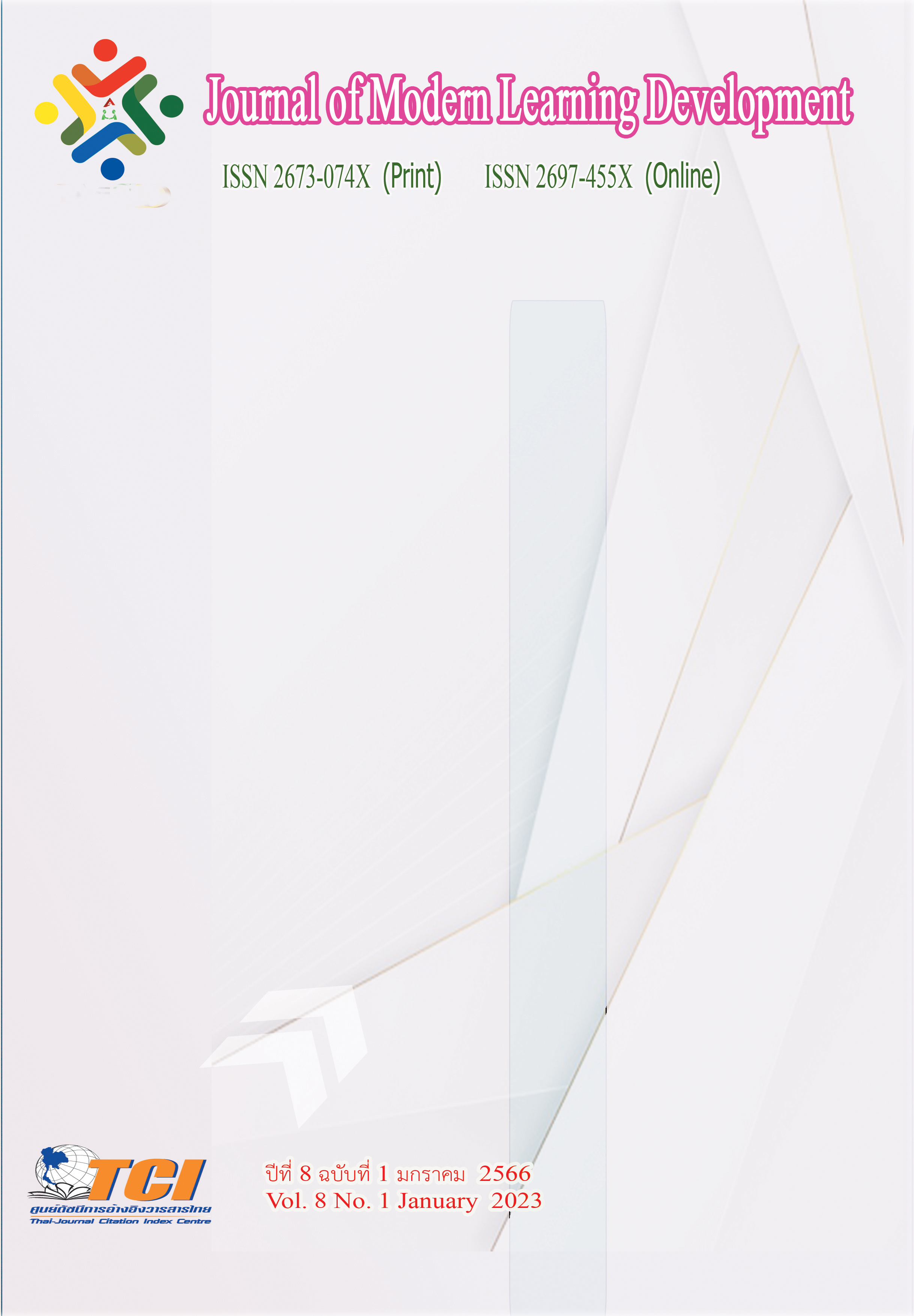The Study of Integrating Technology Competency on Learning Performance of Educational Students for Support Chemistry Management in New Normal Education
Main Article Content
Abstract
In an era of new normal education, as the world undergoes a digital revolution and confronts an unanticipated pandemic, it is necessary to use technology in the classroom. While teachers are undeniably important roles to integrating technology in learning management, teachers’ and pre-service teachers’ integrating technology competency should be examined. Thus, this study aimed to examine integrating technology competency through an enhancement program using a practice-based learning strategy. A qualitative case study design was implemented in this study with 14 third-year pre-service chemistry teachers as the target group using a purposive sampling technique. Data relating to pre-service chemistry teachers’ integrating technology competency was collected from classroom artifacts and analyzed by a content analysis method according to the developed research analytic framework.
It was found that pre-service chemistry teachers’ integrating technology competency was not completed. It was because the curriculum, teaching and learning, and assessment task design did not include 1) meaningful learning and challenging problems developed from students’ interests and 2) interestedness and variety of technology usage.
Article Details
References
Creswell, J. W. (2007). Qualitative inquiry and research design: choosing among five approaches. (2nd ed.). Thousand Oaks, CA: Sage.
Creswell, J. W. (2014). Research Design: qualitative, quantitative and mixed method approaches. (4th ed). Thousand Oaks: Sage.
Dogan, S., Dogan, N. A., & Celik, I. (2021). Teachers’ skills to integrate technology in education: Two path models explaining instructional and application software use. Education and Information Technologies, 26, 1311–1332.
Durak, H.Y. (2021). Preparing pre‐service teachers to integrate teaching technologies into their classrooms: examining the effects of teaching environments based on open‐ended, hands‐on and authentic tasks, Education and Information Technologies, 26, 5365-5387.
González-Sanmameda, M., Sangràb, A., & Muñoz-Carrilc, P. (2017). We can, we know how. But do we want to? Teaching attitudes towards ICT based on the level of technology integration in schools. Technology, Pedagogy and Education. 26 (5), 633–647.
Harris, J., Mishra, P., & Koehler, M. (2009). Teachers’ technological pedagogical content knowledge and learning activity types: curriculum-based technology integration reframed. Journal of Research on Technology in Education. 41 (4), 393-416.
Lappan, G. (1999, November). Knowing what we teach and teaching what we know. National Council of Teachers of Mathematics. https://www.nctm.org/News-and-Calendar/ Messages-from-the-President/Archive/Glenda-Lappan/Knowing-What-We-Teach-and-Teaching-What-We-Know/
Ministry of Education Thailand. (2017). Basic education core curriculum 2008 (revised). Bangkok, Thailand: Agricultural Cooperative Federation of Thailand Press.
Mouza, C., Karchmer-Klein, R., Nandakumar, R., Ozden, S.Y., & Hu, L. (2014). Investigating the impact of an integrated approach to the development of preservice teachers’ technological pedagogical content knowledge (TPACK). Computer and Education, 71, 206–221.
Novak, A. M., & Krajcik, J. (2006). Using technology to support inquiry in middle school science. In L.B. Flick & N.G. Lederman (Eds.), Scientific inquiry and nature of science: Implications for teaching, learning, and teacher education, (75-101). Netherlands: Springer.
Rehmat, A. P. & Bailey, J. M. (2014). Technology integration in sciences classroom: Preservice teachers’ perceptions. Journal of Science Education and Technology, 23 (6), 744–755.
Song, L. (2018). Improving pre-service teachers’ self-efficacy on technology integration through service learning. Canadian Journal of Action Research, 19 (1), 22–32.
Thailand Science Research and Innovation. (2020, January). Thai teachers’ technological competency in 21st century. Ministry of Higher Education, Science, Research, and Innovation. https://researchcafe.org/communications-technology-competencies-for-thai-teachers-in-the-21st-century/
Trowbridge, L. W., Bybee, R. W., & Powell, J. C. (2008). Teaching secondary school science: Strategies for developing scientific literacy (9th ed.). Upper Saddle River, NJ: Prentice Hall.
Yin, R. K. (2009). Case study research: Design and methods (4th ed). Los Angeles, CA: Sage.


